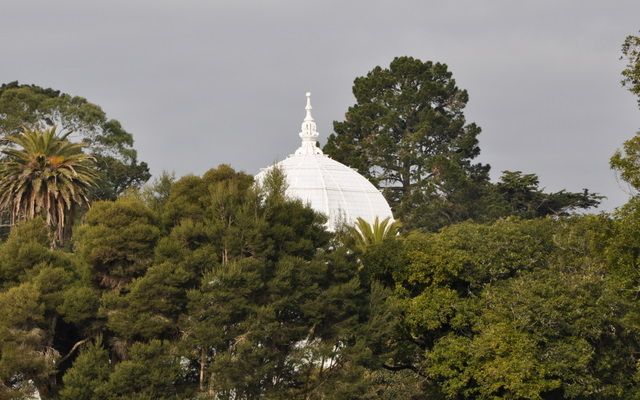Last Chance to Catch NYC's Holiday Notalgia Train
We met the voices of the NYC subway on our nostalgia ride this weekend!



The oldest extant structure in Golden Gate Park is also its most beloved: the Conservatory of Flowers. This beautiful, white-washed structure is the oldest wood-and-glass conservatory in America.

It is believed that James Lick, a prominent and wealthy San Franciscan, purchased the conservatory as a kit from Ireland for $2050 and had it shipped to his estate on the Peninsula. However, it is also thought that portions of the original building contained California redwood. Upon Lick’s death in 1876, The Society of California Pioneers found themselves the owners. They chose to sell it to a group of 27 San Francisco businessmen. These men, in turn, gave it to the City of San Francisco for use in Golden Gate Park. The state legislature appropriated $40,000 for the construction of the greenhouse, beginning a financial arrangement between public and private sources that exists to this day.
Assembled by the New York greenhouse manufacturing firm Lord and Bunham, this fine example of Victorian architecture opened to the public in 1876. When it was destroyed in 1883 by a boiler fire, banker and railroad baron Charles Crocker funded the restoration. Though it survived the 1906 earthquake intact, by 1933, structural instability caused the Park Commission to close the conservatory for 13 years.
Several other incidents required major repairs through the life of the conservatory, yet none dealt a bigger blow than the wind storms of 1995. Over 400 trees were blown down throughout Golden Gate Park and the park was closed for the first time in its history. The damage to the conservatory was extensive: 40% of the glass was smashed, and several wood arches were damaged. As a consequence, the conservatory had the dubious honor of being placed on the World Monument Funds list of 100 Most Endangered Buildings. In 1998, the National Trusts, Save the Americas Treasures, began the process of raising the $25 million required to restore the conservatory.

This restoration was not easy. The conservatory is 12,000 square feet. The central dome is 56 feet in diameter, 55 feet high and weighs 29,000 pounds. Each wing is 93’ long. The finial on top of the dome is 13’ tall and weighs 800 pounds. There are 16,800 windowpanes within a grid of 100 redwood and douglas fir arches. The original walkways formed one of the oldest concrete pours in the west.
Architectural Resources Group and Tennebaum Manheim Engineers tackled the task of putting the conservatory back into public use. It was found that in addition to the ruin done by the storm, the building had an inadequate brick foundation and there was extensive rot in the non-redwood sections.
The six-year restoration included conservation, restoration and rehabilitation. Two-thirds of the redwood architectural elements were reused; the rest came from fallen, old-growth, buckskin redwood logs. All of the clear glass was replaced with safety glass, 90% of the colored glass pieces were reused and 70% of the mullions were salvaged.

The conservatory is now listed on the National Register of Historic Places and The California Register of Historic Places. It is a City and County of San Francisco Landmark and a Historic Civil Engineering Landmark.



If you are interested in viewing the oldest complete collection of highland orchids, the huge Amazon water lilies, or the 100-year-old giant Imperial Philodendron named Phil, you can do so Tuesdays through Sunday from 10 to 4. Ticket information can be found on the Conservatory’s website.
The Conservatory of Flowers [Map]
100 John F. Kennedy Dr.
San Francisco, CA 94118
Follow Untapped Cities on Twitter and Facebook. Get in touch with the author @PQPP3.
Subscribe to our newsletter